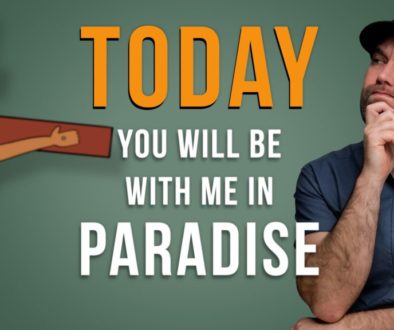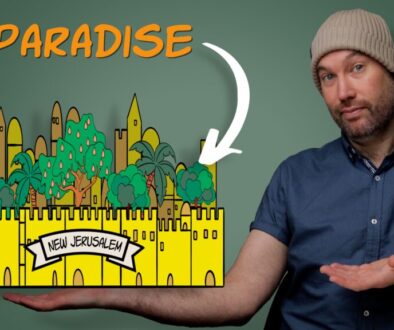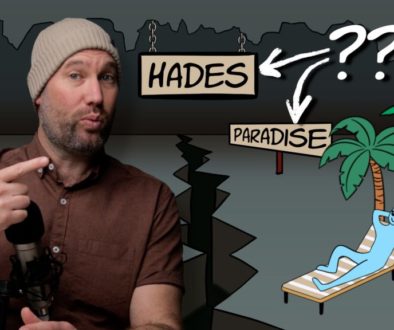What Have We Become?
We all know the story of Noah and the ark. It’s a great children’s story.
My wife and I have 3 kids. At the time of writing this they are aged 5, 3 and almost 2. Having young kids in a Christian household means there’s bound to be kid-friendly Christian paraphernalia around, and it doesn’t get kid-friendly-er than Noah and the ark. Right? I mean a man with a cool boat, lots of fluffy animals and a beautiful rainbow, you can’t go wrong!
That’s why we’ve got not just one, but two different Noah’s ark mobile’s that hang over a baby’s crib. We’ve got a wooden Noah’s ark play set with a boat that comes apart and these cool little wooden animals. And pretty much every children’s Bible in existence features Noah’s ark with animals and rainbow prominently on the cover.
Now, I’m not complaining about these gifts that have been given to us by generous family and friends who love us and our kids. My kids do like boats and animals and rainbows. But lets be honest, in reality there’s nothing cute about the story of Noah. In fact, it’s the absolute lowest and darkest point in the whole Story.
Only Evil All The Time
The story of Noah and the ark, or the flood, is covered in Genesis chapters 6 -9. Here’s what it says in Genesis 6:5-7:
The LORD saw how great the wickedness of the human race had become on the earth, and that every inclination of the thoughts of the human heart was only evil all the time. The LORD regretted that he had made human beings on the earth, and his heart was deeply troubled. So the LORD said, “I will wipe from the face of the earth the human race I have created—and with them the animals, the birds and the creatures that move along the ground—for I regret that I have made them.”
Genesis 6:5-7
And then in verse 11 and 12:
Now the earth was corrupt in God’s sight and was full of violence. God saw how corrupt the earth had become, for all the people on earth had corrupted their ways.
Genesis 6:11-12
There’s an important two word combo in both of those passages that I want to point out:
Had become.
In my last post I talked about the concept of “The Fall” and how I don’t think it is at all a helpful or accurate way to talk about the events of Genesis 3. One of the reasons is that we tend to stop at Genesis 3 as if that’s the whole “Problem” part of the Story. Then we just need to jump ahead to Jesus for the “Solution”, where he fixes what went wrong at “The Fall”.
But here’s a question: if it all went wrong at “The Fall”, why wasn’t God so grieved then? Why didn’t He wipe out humanity at the end of chapter 3, or in chapter 4 after Cain murdered Abel?
Between the story of Cain and Abel and the story of the flood we mostly just have a genealogy. We get the idea that a stack of generations pass and, as God commanded in chapter 1, humans multiply and begin to fill the earth. But there are a couple of interesting little comments thrown in there too. Genesis 4 finishes with:
At that time men began to call on the name of the LORD.
Genesis 4:26
And in Genesis 5:21-24 there’s a short mention of a guy named Enoch. In those 3 verses it mentions twice that Enoch “walked with God”. He’s mentioned again in Hebrews 11:5-6 as “one who pleased God.”
A Descent Into Corruption
As I discussed in my previous post, the “Fall” narrative generally paints a binary picture, particularly with regard to our concepts of sinfulness and relationship. Humans weren’t sinful, then they were. They had relationship with God, then they didn’t.
But what I’m trying to point out is that the Biblical Story gives a much more dynamic picture. Cain and Abel both had the “knowledge of good and evil” but they chose different paths. God told Cain that sin desired to have him, but that he needed to master it. He didn’t master it.
Lamech, a descendent of Cain (Genesis 4:19-24) also chooses evil. Others, by contrast, “call on the name of the LORD” and some like Enoch “walk with God.”
Now jump forward several generations. Many Biblical scholars don’t take the times given in Genesis chapter 5 as factual, but even if you do they add up to about 1700 years from Fall to Flood. That’s a lot of time for a lot of people to make a lot of choices.
We’re not told specifically what kind of choices were made along the way, but we are told in Genesis 6:12 that “God saw how corrupt the earth had become, for all the people on earth had corrupted their ways.” Other than Noah who, once again, is described as righteous (Genesis 6:9).
And as we know, none of us make choices in a vacuum. We’re heavily influenced by our families, our upbringing, our friends, our society and the world around us in general. As 1 Corinthians 15:33 says, “bad company corrupts good character.” And what is considered “normal” behaviour can change over time. Even today, there are things that are considered acceptable by society that were completely taboo 50 years ago.
Why Is This Important?
The Story of God and humanity is much more dynamic than the Common Story tells it. The “Fall” idea says that humanity all became corrupt in a moment. But the story given in Genesis shows that humanity became corrupted over time, and that not everyone was corrupted along the way. It’s a tale of nature and nurture.
One of the issues with modern Christian thinking is our tendency to way overemphasise the metaphysical nature of things. Metaphysical basically means things that are real, but not physical. Like love, or beauty, or the soul. Often these things are multifaceted. Love, for example, has a metaphysical component but is also grounded in both feelings and actions.
Unfortunately, too much Christian thought and doctrine has become overly metaphysical and abstract. The Common Story treats a lot of the major components of the Story as largely metaphysical. Sin, relationship, salvation.
The Common Story presents sin as primarily a metaphysical, abstract thing. Yes sin is something we do. But the problem according to the Common Story isn’t so much that we do sin, it’s that we have sin. It’s that we are considered sinful. Sin is a dark stain on our souls, making us unacceptable to God. We need the blood of Jesus to wash the stain off and make us acceptable to God again. The Solution to sin in the Common Story isn’t to make us people who don’t sin, but to make us considered not sinful.
After the “Fall”, all humans are considered sinful. After the Cross, anyone who believes in Jesus is considered not sinful.
But the Story presented in the Bible is multifaceted. There’s the newfound “knowledge of good and evil” giving humanity the option to choose either. There’s the entity of sin which “desires to have us”. There’s the influence of other corrupted humans who have chosen the path of evil in previous generations. And then there’s a really important aspect that we haven’t looked at yet – the influence of rebellious spirits, which is actually a major theme throughout the whole Story. All these things go together to lead to the corruption of humanity.
And more than that, sin isn’t the only problem.
There’s a lot more to unpack, but I’ll give you a heads up for where this will be going in the future. I’m wanting to show that the “Problem” part of the Story is multifaceted and dynamic. There are several things that have gone wrong along the way. And looking ahead, I want to show that the “Solution” part of the Story is also multifaceted and dynamic. There are several ways that Jesus came to make things right.
Forgiveness is just one part of the plan.
If I lost you a bit with the metaphysics don’t worry, the next post will be dedicated to looking at metaphysics more clearly and how it has shaped so much of Christian thinking.


